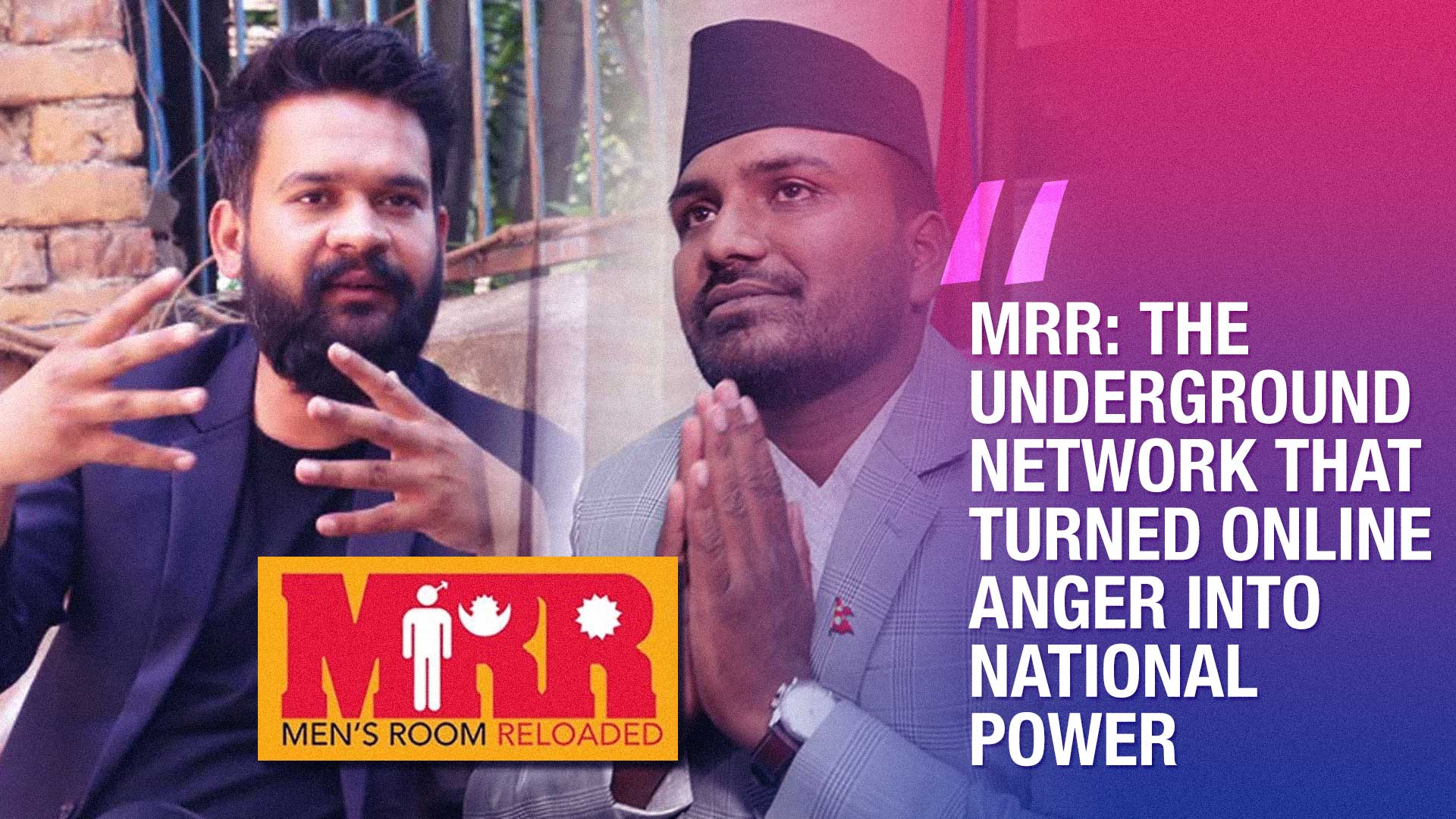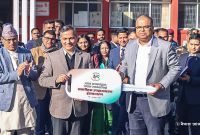Inside Nepal’s Secret Youth Network: How MRR Quietly Powered Balen’s Rise to Power

When Kathmandu’s political map shifted with the rise of Mayor Balendra Shah and the growing national profile of Youth and Sports Minister Bablu Gupta, few traced the political aftershocks back to a little-known online circle formed by college boys in 2012. But that small, spontaneous student group—originally scattered across Trinity, White House, GoldenGate, and other private colleges—slowly transformed into Men’s Room Reloaded (MRR), now regarded as one of Nepal’s most vibrant, disciplined, and influential digital youth ecosystems. What began as casual online banter evolved into a force capable of sparking civic awareness, mobilizing protests, and lifting an entirely new generation of tech-savvy citizens into the public arena.
At its center, MRR remains a selective men-only Facebook group with more than 53,000 highly active members who treat the platform as a space for camaraderie, mentorship, humor, and unfiltered debate. Behind the seeming chaos lies a carefully controlled structure: entry is granted only to trusted or referred individuals, and discussions are subject to an unusually coordinated admin panel. This design—far from accidental—helped the group operate as a safe and formative platform where young Nepali men could question, argue, joke, and eventually organize around civic issues. Members describe the space as their “brotherhood,” a digital community where growing frustrations with governance found articulation and shared purpose.
It was this very culture that made MRR a powerful incubator for online activism. The group gained national attention during the Enough Is Enough movement, where digital outrage over public-health neglect translated into peaceful, coordinated activism. When the Gen-Z protests erupted years later, MRR’s online machinery again channeled scattered anger into disciplined, youth-led street demonstrations. Far from merely spectating, the group offered momentum, reach, and narrative direction—turning hashtags into rallies and discussions into civic pressure. Many young protesters publicly acknowledged that without digital communities like MRR, their anger might never have found organized expression.
A major source of MRR’s strength lies in its management. The admin and affiliated network includes engineers such as Ismam Ansari and Kishor Subedi, designers like Sujan Shrestha, entrepreneurs such as Santosh Kumar Thapa, aviation technician Ashirbad Adhikari, and prominent digital creators including Victor Poudel of Routine of Nepal Banda, Sharma Ji, Yagya Dhakal, Subas Sharma, and Gyan Malla Thakuri. Their collective backgrounds—spanning engineering, aviation, civil society, design, content creation, and grassroots organizing—have turned MRR into a hybrid space where technical skill meets social engagement. This diversity allowed the group to operate as a disciplined digital ecosystem capable of amplifying, moderating, and rapidly disseminating narratives across Nepal’s expanding online landscape.
This influence gradually extended into electoral politics. MRR members were among the early digital supporters who organically boosted Balendra Shah’s mayoral bid, reshaping his public image and connecting him with disillusioned millennials who saw in him an outsider with credibility. Shah’s victory is often portrayed as a political upset, but within MRR circles it is remembered as proof of what digitally coordinated youth could achieve. Similar energy later surrounded Bablu Gupta, whose appeal to youth empowerment and modern governance resonated strongly within the network.
Not all moments were triumphant. In 2021, the original MRR group—once exceeding 100,000 members—was removed by Facebook for violating content policies. While critics argued that the group’s outspoken culture had crossed boundaries, admins maintain that the cleanup inspired internal reforms and stronger moderation standards. “Our priority now is constructive engagement and digital civic education,” said one admin in a public post. Their shift toward structured moderation reflects a growing recognition of the responsibilities that come with influence.
Despite controversies, the larger story of MRR remains one of digital awakening. Young men who once felt politically irrelevant found a venue to express themselves, debate national issues, and learn the mechanics of digital advocacy. The network’s consistency, its alliances across professional sectors, and its ability to replicate messages across interconnected pages have positioned it as one of Nepal’s earliest and most effective youth-driven digital ecosystems. What MRR ultimately built was not only a social group, but an environment where young Nepalis learned to engage, organize, and demand accountability from institutions that had long ignored them.
Today, as Nepal’s digital public sphere expands and political realignments continue, MRR stands as a reminder of the unexpected ways civic consciousness can take shape. From a secret student circle to a nationwide youth movement, it has shown how brotherhood, digital literacy, and collective will can influence activism, elections, and public discourse—one post, one protest, and one young citizen at a time.
Annex: Profiles of Key Admins & Page Managers
1. Ismam Ansari
A Kathmandu-based tech professional with an Electrical Engineering background. Senior Project Manager and former Regional Head at Vector Group of Companies; originally from Janakpur and widely travelled across Nepal.
2. Sharma Ji
A Kathmandu-based digital creator from Pyuthan with an MBS in Management from Shanker Dev Campus. Active on social media since 2010 and known for youth-focused creative content.
3. Ashirbad Adhikari
An aircraft maintenance technician at Yeti Airlines, educated at IOE Thapathali Campus. Originally from Bharatpur, now active in MRR’s volunteer-driven activities.
4. Madan Acharya
Publicly identified as an MRR-affiliated admin/page handler; limited additional information available in the provided materials.
5. Kishor Subedi
A Pokhara-based civil engineer leading TecArch and the renovation venture My Old House – Purano Ghar. Former student leader at Pokhara Engineering College with strong local professional engagement.
6. Victor Poudel
Founder and operator of Routine of Nepal Banda (RONB), one of Nepal’s most influential digital news and update platforms.
7. Subas Sharma (सुवाष शर्मा)
Pokhara-based digital creator and former president of the Student’s Welfare Union at Pokhara Multiple Campus. Background in business studies with active involvement in local youth and student communities.
8. Binod Rimal (विनोद रिमाल)
A private-profile Facebook user who lists marital status publicly; no professional or educational details provided.
9. Yagya Dhakal
Digital creator with interests in physics, mathematics, and electronics. Has worked as Project Manager at Vector Group, in ICT at Surkhet G.V.S, and as an engineer at World Distribution Nepal. Originally from Tulsipur.
10. Sujan Shrestha
Kathmandu-based digital creator and designer. CEO of Yaha Paaucha, founder of Ellex Design, and Admin of MRR. Senior Graphic Designer at Spark Tech with a visible online creative portfolio.
11. Santosh Kumar Thapa
Entrepreneur and national-level Nepal Scouts trainer. CEO/Founder of Koribati, owner of Tridevi Thakali & Restaurant, and founder of Phulbari Multi Business. Also active in media and volunteer networks.
12. Kumar Binod Poudel
Digital creator with professional experience in the F&B sector across Kuwait, Helsinki, Kolkata, and Kathmandu. RR Campus and Tribhuvan University graduate; originally from Biratnagar.
13. Gyan Malla Thakuri
Digital creator from Dhangadhi with long-term engagement in online communities since 2008. Known for consistent content and active presence across platforms including Instagram.
Balendra Shah MRR Bablu Gupta




![From Kathmandu to the World: How Excel Students Are Winning Big [Admission Open]](https://nepalaaja.com/img/70194/medium/excel-college-info-eng-nep-2342.jpg)


